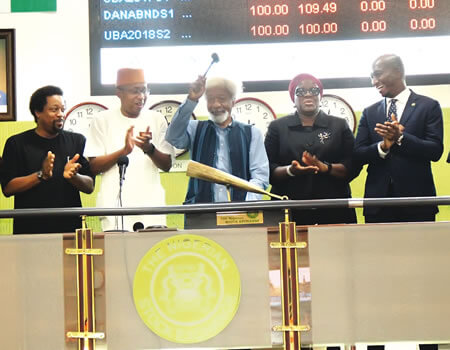At the beginning of 2016 trading year, the Chief Executive Officer of the Nigerian Stock Exchange had projected a positive year for investors in the Nigerian Bourse, however not devoid of challenges. Although, the announcement by the CEO that the Nigerian Capital market had an opportunity to effectively
finance the Federal Government proposed budget deficit for 2016 was met with criticism from different quarters, the Exchange had indeed weathered the storm.
In 2016, Oscar had anticipated the return of investors who had remained on the sidelines throughout 2015, having hinged the return of investor confidence on the effective implementation and communication of the government’s economic blueprint; credibility in monetary policy stance; relative stability in the macro economy (Oil price stability above benchmark targets, increase in tax collection to GDP ratio, etc.); and improved security.
12 months after, the criteria for the return of investors, according to the NSE CEO, is far beyond desiring as the nation’s Gross Domestic Product (GDP) recorded a negative growth of -2.1 per cent, with the Naira exchanging for N304 per dollar at the official market in the latter part of the year at the Foreign Exchange Market.
Analysts believed the exit of foreign investors had a negative impact on the stock market though this might have contributed to the reduced volatility in high priced stocks such as Nestle Plc. Overall, the poor stock market performance, was, however, s a reflection of the effect of oil price shock, Forex challenges as well as uncertainties in global economy occasioned in part by Brexit which kept many foreign investors on the sidelines.
Nigeria’s stock market recorded a year-to-date (YTD) return of -6.14 per cent for the 2016 financial year, even though the market recorded a strong finish in the final trading sessions of the year. Market statistics shows that the overall value of the market represented by the market capitalisation of equities, dipped by N605 billion from N9.851 trillion recorded at the close of year 2015, to N9.246 trillion as the closing figure for 2016. This represented 6.13 per cent drop, lower than 14.17 per cent loss recorded in 2015.
The general market capitalisation which comprises Equities, Bonds and Exchange Traded Products available for trading on the bourse opened the year 2016 with N17.003 trillion and end it with N16.186 trillion.
Consequently, the NSE All Share Index which is the barometer of the market movement dropped 1,767.63 basis points in 2016 as against 6,014.90 basis points recorded in 2015. In percentage, All Share Index dropped 6.17 per cent in 2016 compared to 17.37 per cent it loss in 2015. Specifically, the market index opened year 2016 with 28,642.25 basis points to close at 26,874.62 points.
Also, the Bond segment of the bourse depreciated by N215 billion or 3.01 per cent during the year 206 from N7.140 trillion to end the year with N6.925 trillion.
Meanwhile, Exchange Traded Fund (ETF) which is the third products available for trading on the exchange close stronger with N780 million, translating to 19.41 per cent. The ETF opened the year 2016 with N4.019 billion and close at N4.799 billion.
During the year under review, three sectors appreciated while eight sectors declined. The NSE Lotus Islamic Index that tracks Islamic complied stocks recorded the highest gain of 7.87 per cent during the year, from 1,998.85 points to 1,841.59 basis points. The NSE Premium Board that comprises Dangote Cement Plc, Zenith Bank Plc and FBN Holdings follow with 6.98 per cent surged from 1,584.92 points to 1,695.51 points, while NSE Banking Index recorded 2.17 per cent gain, from 268.49 basis points to 274.32 points.
On the other hand, NSE Industrial Index recorded the highest loss of 571.37 points, represented 26.32 per cent from 2,166.70 points to end 2016 with 1,595.33 points.
However, NSE Oil & Gas Index, Insurance Index and NSE Main Board Index dropped 12.31 per cent, 11.44 per cent and 10.02 per cent from 356.56 points, 142.61 points and 1,337.85 points they opened to end the year with 312.68 points, 126.29 points and 1,203.79 points respectively. The NSE 30 Index that tracts 30 most capitalized stocks depreciated by 92.47 points or 7.18 per cent from 1,287.67 points to close at 1,195.20 points. NSE Consumer Goods Index dropped by 33.54 points or 4.49 per cent to end the year 2016 with 712.65 points from 646.19 points it opened the year, Alternative Securities Market (ASeM) depreciated by 18.96 point represented 1.57 per cent from 1,208.65 points to close at 1,189.69 points, while the NSE Pension Index dropped 5.12 points or 0.63 per cent to end the year with 810.04 basis points.
In the year 2016, investors of 82 quoted companies got returns on their investments as the companies declared dividend and bonus as remained a key attraction to shareholders as they usually look up to what various companies have to offer at the end of every financial calendar.
Financial services sector took the lead in the list dividend declaration, with 27 stocks and closely followed by Consumer and Industrial Goods sectors with 16 and nine stocks each. Oil & Gas sector has seven stocks, while ICT and Natural resources have two each. Nestle Nigeria Plc, Total Nigeria PLC, Dangote Cement PLC and Mobil Nigeria Plc, however, declared the highest dividends in the course of the year with 1900k, 1200k, 800k and 720k dividends for each share held respectively.
Market watchers note the prevailance of the Nigerian equities market against the stormy weather remained through a good part of this year. However, events in the last couple of weeks showed substantial improvements to make one anticipate brighter prospects in the market, as the market experienced substantial growth in the later part of the year.
Not however being deterred by year 2016, stakeholders of the Nigerian Capital market posit better trading year in 2017. Recently in an analyst had said there would be improvement at the Federal Government level in 2017, going by the various fiscal policy measures being articulated to stimulate the economy.
Dr Glenn Prince-Abbi, the Chief Executive Officer, Espera Global Corporation, had in an interview with the News Agency of Nigeria (NAN) said Nigeria’s foreign reserves would likely improve in 2017 with sustained stability in crude oil production output and through a progressively diversified export revenue structure.






